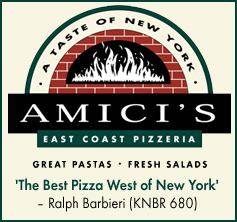| |
|

East Bay SPCA is a shining new model for Bay Area shelters
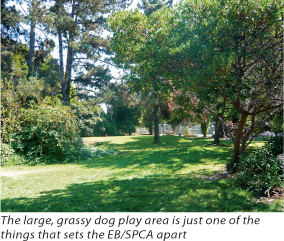 East Bay SPCA executive director Allison Lindquist is standing in front of the Oakland adoption center picking dandelions. “They’re for the rats,” she explains. Clad in casual slacks and a comfortable shirt, she takes us around the side. In a large, dog-park-like play area, a volunteer sits under a shady tree watching Greta, a sweet brindle pit bull, roll in the grass. Lindquist takes us in to say hello. “Poor baby was used for breeding. She’s such a great dog …” she says, scratching Greta’s behind, “Aren’t you, girl?” East Bay SPCA executive director Allison Lindquist is standing in front of the Oakland adoption center picking dandelions. “They’re for the rats,” she explains. Clad in casual slacks and a comfortable shirt, she takes us around the side. In a large, dog-park-like play area, a volunteer sits under a shady tree watching Greta, a sweet brindle pit bull, roll in the grass. Lindquist takes us in to say hello. “Poor baby was used for breeding. She’s such a great dog …” she says, scratching Greta’s behind, “Aren’t you, girl?”
Inside the center, we visit Club Second Chance, an area devoted to dogs that are older or medically or behaviorally challenged. “About 30 percent of our animals are in Club Second Chance,” Lindquist says. “We are so grateful to our donors who provide the financial support to heal the wounds and broken bones and to the wonderful people who open their hearts to these special animals. We offer reduced adoption fees and we partner with businesses in the community – vet clinics, boarding, grooming, pet stores – to offer them special discounts.”
These animals don’t move as quickly as the younger, healthier, obvious choices, but Lindquist says that’s OK. “We had a pit bull mix named Maribel,” she says. “She had a rough start in life, and she was with us two years, but she just got adopted!” Lindquist does a little happy dance, genuinely happy for Maribel’s change of luck. “We are fortunate to have two shelters – this one and the one in Dublin – so we are able to rotate animals between the two. The animals get a change of scenery and they also get to meet a wider selection of potential adopters. Our Dublin facility has a really large dog habitat, so it greatly reduces shelter stress.”
The EB/SPCA also has a “sleepover program,” where staff and volunteers can take animals home on the days the shelter is closed.
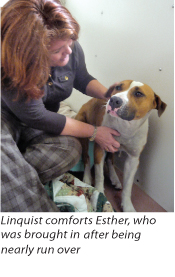 Lindquist says the EB/SPCA also decreased adoption fees. “We have seen a significant increase in adoptions, and it hasn’t translated to any more animals being returned.” Lindquist says the EB/SPCA also decreased adoption fees. “We have seen a significant increase in adoptions, and it hasn’t translated to any more animals being returned.”
Prior to coming to the EB/SPCA in May 2006, Lindquist worked as the assistant director of the Oakland Zoo for 10 years. She has a degree in zoology, spent two years in the Peace Corps, and a decade in the financial field in Boston before following her heart into nonprofit animal work. During her tenure at the Oakland Zoo, she saw the need for pit bull rescue – finding dogs on the freeway or dumped at the zoo – and started her own rescue, Lucky Dog, out of her own pocket.
“At one point, I had 15 pit bulls at my house in the Oakland Hills,” she laughs. “I’m sure that’s why my marriage didn’t work out – I couldn’t see my husband’s head through the five pit bull heads on the pillows between us.”
Over five years, she placed over 200 dogs in loving homes. She had to give up private rescue when she took the EB/SPCA job, but because of her background, she constantly reaches out to grassroots rescue groups. “I knew Pali Boucher when I was doing pit rescue. I wanted to reach out to her because I knew she was having a tough time. We gave Rocket Dog a donation and offered them low-cost spay and neuter and vet care.”
Many businesses come forward to donate items such as collars and toys, and Lindquist says those contributions go a long way. “It allows us to spend our donor dollars where they should be spent – directly helping animals.”
One of the companies making regular item donations to the EB/SPCA is Pet Food Express. Mike Murray, who does shelter outreach for the company and has worked in private rescue with German shepherds for many years, is a big fan of Lindquist’s: “As executive director of the East Bay SPCA, Allison Lindquist combines all the skills and traits you want to see in someone running a multimillion-dollar animal care facility,” Murray says. “She has the business sense needed to make things happen and she has the heart and compassion to care for that special needs animal that shares her office or her home on any given occasion.”
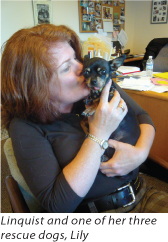
The EB/SPCA operates on a $4 million budget and is supported solely by donations. For fiscal year 2007, they had a deficit of $280,000. Yet they have some of the most innovative programs of any shelter in the Bay Area. One that Lindquist is particularly proud of is the humane advocate program. “We have one little van,” Lindquist explains, “and our humane advocate, Meggan Stringent, goes out to the community to offer help, education, or just someone to listen.”
They already have many success stories, including a case of some backyard breeders turned spay and neuter advocates: “Meggan went out on a case with ACC where these guys were breeding pit bulls. ACC confiscated the dogs, and we fixed them for free. Meggan stayed in touch – she showed these guys the importance of spaying and neutering. Now they speak out on the topic. They keep in touch with Meggan and ask her to come talk to guys in the neighborhood.” Supporters have been so impressed that they donated enough for a second van. “We want to expand the program with more staff so we can go to more neighborhoods.”
In addition to the Humane Advocate program, Lindquist also partnered with Lighthouse School for TLC (Teaching Love and Compassion), a five-week, daily after-school class for at-risk youth – the EB/SPCA brings dogs and works with counselors. “It’s important to get the message of animal compassion to these kids at an early age,” she says. “We would love to partner with some corporate sponsors who could offer the graduates jobs in the animal world.”
The EB/SPCA’s renowned spay and neuter clinic is just down the street. In a 700-square-foot hospital, they performed 9,100 surgeries last year, nearly all of them at very low cost or free. They fix feral cats and pit bulls for free and offer sizable discounts to rescue groups. “We reach out to the community – we give them vouchers for free spays and neuters. We work with the Oakland Housing Authority to give out vouchers. We’ve been doing block parties where someone hosts it at their house and translates [to Spanish] for us ...”
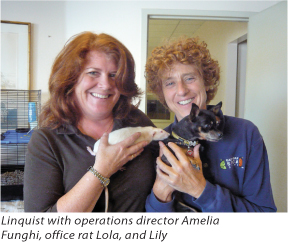 Lindquist says the EB/SPCA pulls animals from the city-run shelters in Alameda and Contra Costa counties. “We tell them to give us the toughest cases,” she says. “The medical issues, older animals, the pit bulls. We know they can find homes for the young, cute animals, and we want them to get the adoption fees for those. What we have at the EB/SPCA that the city-run shelters don’t have is time. We can keep an animal until we find the perfect home. And that’s what we do.” Lindquist says the EB/SPCA pulls animals from the city-run shelters in Alameda and Contra Costa counties. “We tell them to give us the toughest cases,” she says. “The medical issues, older animals, the pit bulls. We know they can find homes for the young, cute animals, and we want them to get the adoption fees for those. What we have at the EB/SPCA that the city-run shelters don’t have is time. We can keep an animal until we find the perfect home. And that’s what we do.”
Lindquist explains that the EB/SPCA only pulls animals from the areas it serves. “Do I feel good about leaving those dogs behind to die in the high-kill shelters in the Central Valley? No. But we have to worry about the animals suffering and dying in our own backyard. It’s tough now for city- and state-funded shelters, but places like Lake County and Fresno need education and spay/neuter ordinances. They need to get the vet community to volunteer; create a 501c nonprofit and throw fundraisers to subsidize free spay and neuter days. It’s hard because it all comes down to money, but if they could just see the benefits of responsible pet ownership – that’s the only thing that
will work. If we take their animals, it allows them to turn a blind eye to a problem that is bigger than all of us.”
Last year, the EB/SPCA adopted out over 1,700 dogs and cats, and they are on track to do more in 2009. “People get hung up on adoption numbers,” she says, “but we have to be careful not to leave our backyard dogs behind – I call them the Big, Brown Dogs – the old ones, the sick ones, the shy ones, the abused and neglected ones … the forgotten ones.”
The EB/SPCA isn’t wedded to one testing method and they won’t fail a dog once and write it off. “We want to give these animals every chance to succeed,” she says. “An animal has to be very sick, suffering, or the situation egregious before we will put them down.”
We head into the isolation area, where dogs with serious injuries can rest in a quiet environment. A beautiful brown and white pit sits on her bed, her eyes filled with that distant look of throwaway dogs. Lindquist opens the door and sits down on the kennel floor, gently scratching underneath the dog’s chin. “A homeless friend of ours saw some guys kicking her in a parking lot,” she says. “Then someone tried to run her over with a car. He stopped them and brought the dog to us – she was starving and her leg was hurt. Turns out she has a torn ACL. She’s also in heat.” We meet Dr. Levinson, who says the dog, named Esther by the staff, will be fine. “After all she’s been through, the first thing she did when I examined her was kiss me.”
We ask Lindquist if they will perform the expensive ACL surgery on Esther and she nods emphatically. “Of course,” she says. “We’ll take good care of her and find her the wonderful home that she deserves.” She kisses Esther’s nose. “We’ll give you a bath once you trust us and you’ll feel much better,” she tells her. The dog takes a deep sigh, her eyes closed, finally peaceful. “My staff came in last night, covered her with blankets, and tucked her in,” Lindquist says.
When asked how the economy and budget constraints affect how they care for the animals, Lindquist shakes her head. “When the economy tanked, we said, ‘Now’s the time to hunker down, stick to the plan, stay on top of expenses, and move forward.’” She says she is thankful for her intrepid staff and board, and for the donors who support the shelter and its programs. “We are 100 percent donor-supported, and we take that very seriously. We have a lean staff but we get things done.”
Back in Lindquist’s office, we meet her menagerie: mice, birds, two rats named Lola and Sass, and a tiny Chihuahua named Lily whose tongue hangs out to one side where she is toothless. “I was judging a charity contest at the Marin Fairgrounds and Lily won ‘Ugliest Dog’ – she was a stray – old and crunchy and pretty shut down. She’s opened up a lot, and she’s hysterical – she rules my pit bulls at home.”
We meet operations director Amelia Funghi who is sitting at her desk working at the computer and socializing a feral kitten wrapped in a blanket in her arms. Joe Romano, director of foster care, is on the phone with a potential home for one of the animals. Volunteers are playing with cats and bathing dogs. “We would love more volunteers to bathe dogs,” Lindquist says. “They feel so much better after a nice bath.”
As we walk through the kennels of pit bulls, black cats, purebreds, and Chiweenies, Lindquist knows each by name. She stops at an empty cage – a pointer named Astaire has been adopted. “He was so high energy,” Lindquist says. “I am so happy!” We continue outside, where more dogs are romping in the play yard. “A lot of these animals would go to city shelters, but animals and good Samaritans don’t know jurisdiction. We have an ethical obligation. We work with everyone – rescues, fosters, volunteers, other shelters. That’s what makes this all work so well.”
For more information on the East Bay SPCA, please call 510-569-0702 or visit www.eastbayspca.org. Donations can be made online or by mail: East Bay SPCA, 8323 Baldwin Street, Oakland, CA 94621.


|
|
|
|






 East Bay SPCA executive director Allison Lindquist is standing in front of the Oakland adoption center picking dandelions. “They’re for the rats,” she explains. Clad in casual slacks and a comfortable shirt, she takes us around the side. In a large, dog-park-like play area, a volunteer sits under a shady tree watching Greta, a sweet brindle pit bull, roll in the grass. Lindquist takes us in to say hello. “Poor baby was used for breeding. She’s such a great dog …” she says, scratching Greta’s behind, “Aren’t you, girl?”
East Bay SPCA executive director Allison Lindquist is standing in front of the Oakland adoption center picking dandelions. “They’re for the rats,” she explains. Clad in casual slacks and a comfortable shirt, she takes us around the side. In a large, dog-park-like play area, a volunteer sits under a shady tree watching Greta, a sweet brindle pit bull, roll in the grass. Lindquist takes us in to say hello. “Poor baby was used for breeding. She’s such a great dog …” she says, scratching Greta’s behind, “Aren’t you, girl?”  Lindquist says the EB/SPCA also decreased adoption fees. “We have seen a significant increase in adoptions, and it hasn’t translated to any more animals being returned.”
Lindquist says the EB/SPCA also decreased adoption fees. “We have seen a significant increase in adoptions, and it hasn’t translated to any more animals being returned.”
 Lindquist says the EB/SPCA pulls animals from the city-run shelters in Alameda and Contra Costa counties. “We tell them to give us the toughest cases,” she says. “The medical issues, older animals, the pit bulls. We know they can find homes for the young, cute animals, and we want them to get the adoption fees for those. What we have at the EB/SPCA that the city-run shelters don’t have is time. We can keep an animal until we find the perfect home. And that’s what we do.”
Lindquist says the EB/SPCA pulls animals from the city-run shelters in Alameda and Contra Costa counties. “We tell them to give us the toughest cases,” she says. “The medical issues, older animals, the pit bulls. We know they can find homes for the young, cute animals, and we want them to get the adoption fees for those. What we have at the EB/SPCA that the city-run shelters don’t have is time. We can keep an animal until we find the perfect home. And that’s what we do.” 
